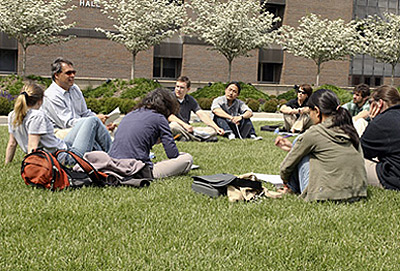Photographs: Courtesy University of Cincinnati Divya Nair
Dr Jonathan Weller, dean of international admissions at the University of Cincinnati, USA, offers Indian students advice on how to make an education abroad possible.
For Indian students aspiring to study abroad, it's raining scholarships in the USA.
In an earlier article we told you about the Business Scholars Programme offered by the Pacific University, Oregon.
And now one of the premier public universities in the US, the University of Cincinnati is not only offering new short-term programmes that reduce the time spent in education, but also offers unique Global Outreach Scholarships that aim to take care of the entire tuition costs.
Dr Jonathan Weller, dean of international admissions at UC, who was recently in India to promote these scholarships and the new programmes, says that of the 3,000 international students studying at the university, 600 are from India.
Dr Weller believes that Indian students have relatively higher GPA and TOEFL scores than their counterparts from other countries, and will hence find it easier to avail of these scholarships and reduce their cost of education.
"Indian students are academically bright, but unfortunately do not have access to quality higher education. They look at the United States of America as a plausible destination to pursue their dreams because we are student-friendly as a nation. Cincinnati, for one, is very much like any Indian state. We strongly believe in family values and take good care of the students who visit us," he says.
Besides the Global Outreach Scholarships, the university is also offering merit-based scholarships, some of which cover upto 40 per cent of the cost of education. Keeping in mind the professional demands of international candidates who want that extra edge in their careers, they have also come up with intensive one-year programmes at the post-graduate level.
In this interview, Dr Weller tells us why international students, including those from India, are in favour of one-year master programmes and what Indian students can do to make the most of an education abroad.
Please click NEXT to continue reading...
'A lot of Indian students find our courses expensive'
Image: The University of CincinnatiPhotographs: Courtesy University of Cincinnati
What was the purpose behind introducing one-year post graduate programmes at the institute?
Although we have over 300 graduate programmes, most of our undergraduate programmes are of four years duration, while most other countries have three-year graduate programmes.
We cannot change the US system of education overnight. Since we could not address the undergraduate level, we worked out a strategy at the post-graduate level.
After talking to several students, we realised that we had to introduce intensive short term programmes to cater to professional candidates who want that extra edge in their careers. Most of these professionals do not want to spend two years in education.
Some want a quick degree to boost their careers, others have to take care of their families, and a one-year masters degree was just what they wanted.
Some of our popular one-year programmes include masters in engineering, finance and LLM (masters in law).
The number of Indian students at your institute has not increased much over the years. Any particular reason?
Without any promotional activities, we have over 3,000 international students studying at the institute and our aim is to give them the best of education and amenities. The numbers have increased steadily, if not considerably, and Indian students comprise our second largest population among international students, next to China.
To an extent, what you pointed out is true. In the last few years, we realised that a lot of Indian students find our courses expensive. That is the reason we introduced new scholarships.
Last year, we provided scholarships of upto five million dollars (over Rs 25 crore) across various post-graduate programmes.
Although undergraduate courses are not as popular as post-graduate programmes due to their relatively longer duration, we provided merit-based scholarships upto two million dollars in 2010. We plan to increase the number of global outreach scholarships for international students in the next few years.
'Most of our one-year post graduate programmes are funded through merit scholarships'
Image: The University of CincinnatiPhotographs: Courtesy University of Cincinnati
How can Indian students apply for these scholarships and how do they help?
The scholarships are available for specific courses and are largely meant to benefit international students from countries like China, India, South Korea, Canada, France, Taiwan, Sri Lanka, Turkey, Saudi Arabia and Mexico.
Most of our one-year post graduate programmes are funded through merit scholarships.
The merit scholarships are given to one or more students per programme. For example, the $10,000 merit scholarship for the one-year masters in engineering programme takes care of 40 per cent of the tuition fees.
Similarly, the $20,000 scholarship for the two-year masters in engineering programme is just the beginning for a deserving student. If s/he takes up an assistantship job at the university, it will help fund a major part of his/her education and living costs.
For post-graduate scholarships, students must have a GPA of 3 and above to apply, besides a TOEFL score of over 100.
We also have the Global Outreach scholarships, which are fully funded scholarships offered to meritorious students.
You'd be happy to know that Indian students stand a better chance at scholarships because they have a good command over the English language and better GPAs.
For more details on the scholarships, visit https://admissions.uc.edu/scholarships.html
'Be careful not to be fooled by big scholarship claims'
Image: The University of CincinnatiPhotographs: Courtesy University of Cincinnati
What are the common mistakes Indian students make while applying to your university and how can they rectify them?
The college application says a lot of things about who you are and what you want from the university. So you have to be careful about what you put in there.
Sometimes, students write vague statements like: 'I want to do this project because I think it will change the world.' But nowhere in the application does the student go about explaining how s/he thinks the project will change the world.
You may have a great idea, but you must be able to explain and tell us how you plan to go about it.
Then we have students who apply to the university without doing adequate research. So, they'll say that they'd like to do a certain course, but you'll soon find out that they don't know anything about the coursework and research options.
English being the medium of instruction, we expect our students to have a reasonable command over the language. We also expect our students to write their own essays. We can easily tell the difference if someone else has written it for the student, because it fails to bring out the student's potential and interests.
We understand that international students follow a different timeline and system of education. So we advise them to apply early and well before the deadline, which is in February for the fall intake. Most often, we find students calling up the admissions office in April and July to ask if they can still apply.
Students must also not get confused between scholarship deadlines and admission deadlines. They are different from each other.
Be careful not to be fooled by big scholarship claims. Last year, we had this bright Indian student who had won a $9,000 scholarship. The parents, however, argued that they had received a $15,000 scholarship from another university for the same course and complained that we were being unfair to them. Our counsellor had to explain to them that the overall tuition fee of the said university was relatively higher and hence the $15,000 scholarship amount contributed little.
While considering study abroad scholarships, one must consider the overall tuition fee, the external living costs, quality of education etc.
'See your education years abroad as investment years'
Image: The University of CincinnatiPhotographs: Courtesy University of Cincinnati
What should Indian students do to make the most of their education abroad?
The best thing to do would be to see your education years abroad as investment years.
Engage with your professors and batchmates outside the classroom. Take a trip around the campus, make new friends who are not from your home country and improve your networking skills.
Be a part of the university's social media club and get to know who your seniors are. Some of them could help you get a roommate, suggest a new place to visit during the weekend or give you free career advice.
In the US, we expect that if we have an activity club, you will find a way to get involved with it. We call it social integration.
Besides, there is this popular saying that we believe in: It's not what you know, but who you know that matters.
At the University of Cincinnati, there are over 200 community clubs for students. Join one of them and make your presence felt.






Comment
article